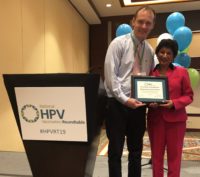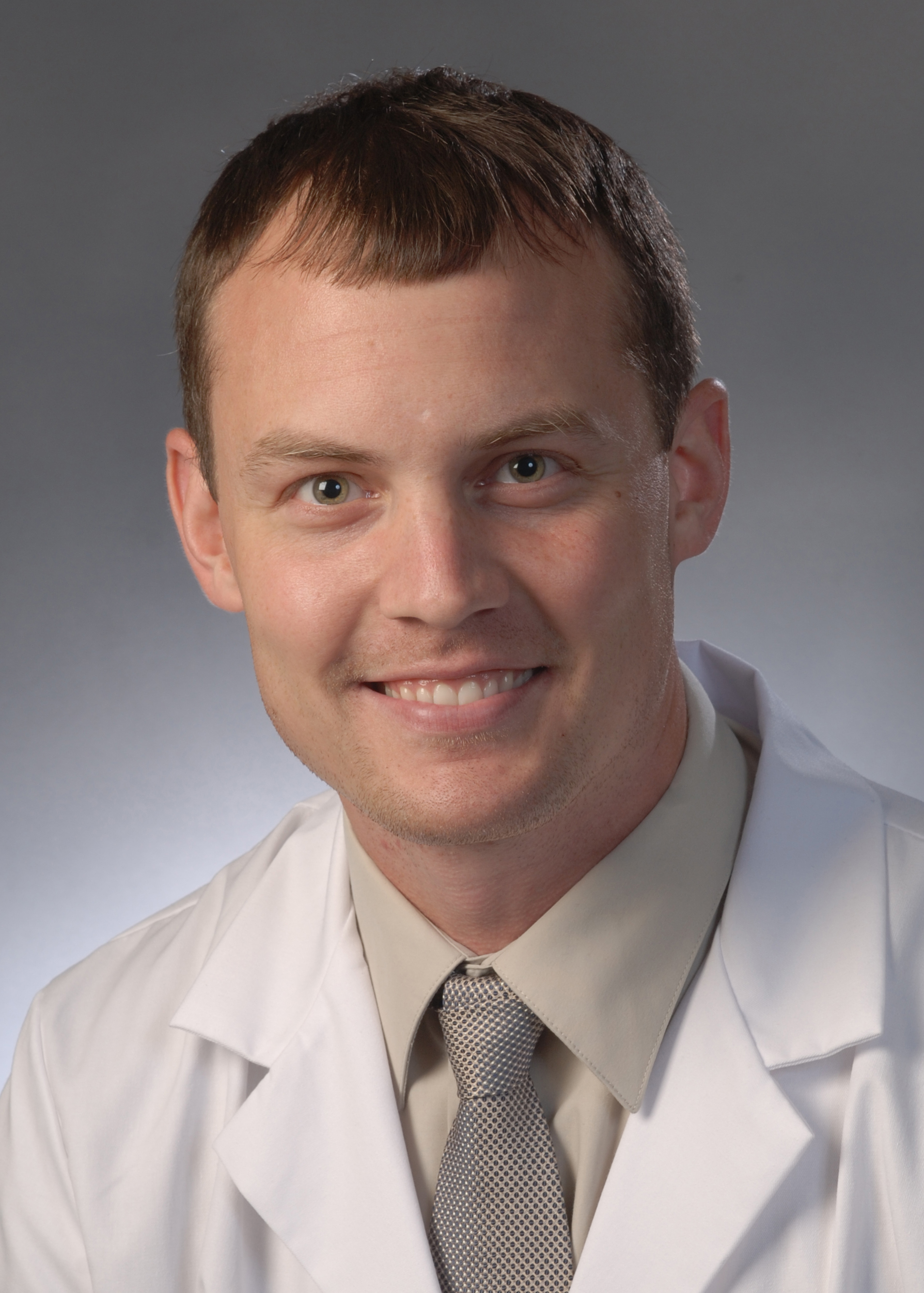- Substantial savings on registration fees for the AHNS Annual Meeting
- Access to member-only Research Awards and other awards
- Opportunity to participate in services and leadership positions
- Opportunity to join as many sub specialty sections as they wish at no extra cost
- Option to create a profile on our “Find a Physician” site for patients and physicians
- Annual online subscription to JAMA Otolaryngology-Head and Neck Surgery
- Opportunities to network with colleagues and experts
- Cutting-edge education and professional development programs
- Exposure to state of the art surgical technology and techniques
- An AHNS member certificate for their office or home
Overcoming Barriers to Follow-Up After Head and Neck Cancer Screening
Dr. Raquel Zemtsov and her colleagues were recipients of a 2018 AHNS Community Service Award. Five awards of $1000 each are awarded annually by the AHNS Cancer Prevention Service.
Because we were fortunate to receive the American Head and Neck Society Community Service Award, the University of Cincinnati Head and Neck Cancer team was able to provide resources to our head and neck cancer screening attendees that aided in their follow-up. This grant enabled us to gain important information on factors that impact follow-up for patients who have difficulty accessing health care. Grant money was used to fund a screening-specific patient navigator who identified barriers to follow-up and provided targeted, individualized interventions. One such intervention was to provide bus passes to patients which the grant made possible. Our data demonstrated that the presence of a patient navigator significantly increased follow-up compared to other screenings where such a role was not present (p=0.0026). Copyright to a literacy tool was purchased using grant funding to allow our team to define the health literacy of populations at different screening sites, allowing us to better understand the needs of the patients we are serving.
For instance, our data demonstrated that health screening attendees at a public park compared to those screened in a healthcare setting had, on average, graded scores lower than a high-school grade reading level (p=0.008) and more individuals with marginal or inadequate health literacy (p=0.04). Those individuals in the park also had lower follow-up rates despite provision of the same resources (p=0.015). Further, of patients with a literacy barrier, only 20% followed-up.
Seeing the variance in health literacy and the impact it can have on follow-up, we investigated the reading level of the patient education materials disseminated at our screenings. The average grade-reading level was found to be 13.0, or that of a freshman in college. The National Institutes of Health recommends patient education materials be printed at or below a 6th grade reading level1. The remaining funds of the grant helped to cover printing costs of an informational pamphlet about head and neck cancer at a more appropriate reading level to reach a broader population. These pamphlets that provide general information about head and neck cancer is printed below a 6th grade reading level and will be distributed at both future screening events and our head and neck cancer clinic.
We were able to identify other barriers aside from literacy that affected follow-up. Limited knowledge regarding head and neck cancer, limited access to transportation, limited access to a telephone, and being a caregiver for another individual with health needs were found to impede individuals’ abilities to seek appropriate follow-up care. For instance, half of the patients who initially were not going to make follow-up due to misconceptions regarding head and neck cancer, education following the screening motivated them to make and attend appointments.
The information we have garnered from our screenings facilitated by the AHNS Community Service Award will help us provide more appropriate patient education materials and tools to facilitate recommended follow-up at our future screening events. This experience has also facilitated important discussions and projects regarding access and patient education at our institution outside of head and neck cancer screenings. Our next steps include incorporating patient navigators more consistently at screening events and editing our other educational materials to be at appropriate grade-reading levels.
AHNS Journal Club – September 2019
The AHNS Journal Club regularly reviews the leading head and neck cancer-related journals, sharing with AHNS members some of the most relevant and important manuscripts, and providing summaries and critiques of the work. The Journal Club members are: Samer Al-Khudari, MD; Daniel Brickman, MD; Nathan Hales, MD FACS; Jason Kass, MD PhD; Luiz Kowalski, MD PhD; Vikas Mehta, MD MPH FACS; Alirio Mijares Brinez, MD; Alvaro Sanabria, PhD; Mark Varvares, MD; Vivian Wu, MD MPH.
Sentinel Lymph Node Biopsy Versus Elective Neck Dissection for Stage I to II Oral Cavity Cancer
Cramer JD, Sridharan S, Ferris RL, Duvvuri U, Samant S.
from Laryngoscope, January 2019
Stage II Oral Tongue Cancer: Survival Impact of Adjuvant Radiation Based on Depth of Invasion
Samuel J. Rubin, Ellen B. Gurary, Muhammad M. Qureshi, Andrew R. Salama, Waleed H. Ezzat, Scharukh Jalisi, and Minh Tam Truong
from Otolaryngology–Head and Neck Surgery, January 2019
Vivek R. Varma, MD, MBA ; Antoine Eskander, MD, ScM; Stephen Y. Kang, MD; Bhavna Kumar, MS; Nicole V. Brown, MS; Songzhu Zhao, MS; Guy Brock, PhD; Amit Agrawal, MD; Ricardo L. Carrau, MD; Matthew O. Old, MD; Enver Ozer, MD; James W. Rocco, MD, PhD; David E. Schuller, MD; Peter T. Dziegielewski, MD; Michael J. Cipolla, MD; Theodoros N. Teknos, MD
From Laryngoscope, February 2019
Yue Ma, MD, Benjamin M. Laitman, MD, PhD, Vir Patel, MD, Marita Teng, MD, Eric Genden, MD, Samuel DeMaria Jr, MD, and Brett A. Miles, DDS, MD
from Otolaryngology–Head and Neck Surgery, January 2019
Eyun Song, Minkyu Han, Hye-Seon Oh, Won Woong Kim, Min Ji Jeon, Yu-Mi Lee, Tae Yong Kim, Ki Wook Chung, Won Bae Kim, Young Kee Shong, Suck Joon Hong, Tae-Yon Sung, and Won Gu Kim
from Thyroid, January 2019
The AHNS Cancer Prevention Service – Chair’s Report
The Year in Review
We have had an exciting and productive year on the AHNS Cancer Prevention Service. In the past twelve months, we awarded five Community Service Awards to our members, developed an AHNS position statement on the use of tobacco, E-cigarettes and marijuana, participated in the Inaugural USvsHPV event in January, helped promote the annual Oral and Head and Neck Cancer Awareness Week, and are working on developing a toolkit for head and neck cancer screening and education in homeless populations, among other projects. This year, we have plans to expand on these efforts and will also initiate many new endeavors to promote the early detection and prevention of head and neck cancers.
What’s New?
 This photo shows Dr. Cherie-Ann Nathan (President of the AHNS) and Dr. Michael Moore (Chair, Cancer Prevention Service of the AHNS) at the recently held Annual Meeting of the American Cancer Society’s HPV Vaccination Roundtable in Atlanta, GA. This conference brought together stakeholders from over 70 participating organizations focused on finding ways to increase HPV vaccination rates in America. Sessions were held to highlight best practices in areas including health policy, physician recommendations, and patient and public education. Additional discussions centered around how best to combine the expertise and reach of the member organizations to raise awareness of HPV-related diseases and dispel myths surrounding HPV vaccination.
This photo shows Dr. Cherie-Ann Nathan (President of the AHNS) and Dr. Michael Moore (Chair, Cancer Prevention Service of the AHNS) at the recently held Annual Meeting of the American Cancer Society’s HPV Vaccination Roundtable in Atlanta, GA. This conference brought together stakeholders from over 70 participating organizations focused on finding ways to increase HPV vaccination rates in America. Sessions were held to highlight best practices in areas including health policy, physician recommendations, and patient and public education. Additional discussions centered around how best to combine the expertise and reach of the member organizations to raise awareness of HPV-related diseases and dispel myths surrounding HPV vaccination.
How Can You Get Involved?
AHNS Members, WE NEED YOUR HELP! One theme that has consistently come through is the lack of practitioner and public awareness of HPV-related oropharyngeal cancer. It is estimated that there will be approximately 19,000 new cases of HPV-related oropharyngeal cancer in the US this year (www.cdc.gov), making it the most common HIV-related cancer in America. However, unlike cervical cancer, there is no known premalignant precursor of these cancers and we have no effective screening protocol. As a result, these rates are likely to continue to increase, making disease prevention that much more important.
There is currently available on the AHNS Cancer Prevention website a 20-slide presentation on HPV-related oropharyngeal cancer, its associated treatment and the importance of vaccination. Over the next few months, CPS members will be updating these slides and developing a narrated version that can be disseminated by members to their region’s pediatricians and primary care providers. As a part of this initiative, we also hope to provide pre- and post-presentation surveys to perform a gap analysis on these topics to see how best to educate those on the front lines in these vaccination efforts.
Future Projects
The Cancer Prevention Service also has plans to work with the Patient and Public Education Service as well as the Mucosal and Cutaneous Sections to develop lesion libraries to provide visual examples of benign, premalignant and malignant lesions. These resources will then be formatted to best allow them to be distributed to and used by the general public around the time of cancer screening events.
Integrative Medicine
There is an evolving base of knowledge related to the role of integrative medicine in cancer prevention and management. Members of the Cancer Prevention Service will work to update the AHNS members on what is known about integrative medicine in head and neck cancer prevention.
If you have interest in getting involved in these or other projects related head and neck cancer prevention, please contact us at [email protected]. We look forward to working with you.
Sincerely,
Michael Moore, MD
Chair, Cancer Prevention Service
Ann Gillenwater, MD
Co-Chair, Cancer Prevention Service
Call for Abstracts – Submissions Open Now

AHNS Call for Abstracts
AHNS 10th International Conference on Head and Neck Cancer
“Survivorship through Quality and Innovation”
July 18-22, 2020
Hyatt Regency Chicago
Chicago, Illinois
Submit Your Abstract Now
Abstract Submission Supporting Documents:
NOTE: ALL content authors are required to disclose any financial relationship(s) with an ACCME-defined commercial interest (“industry”). AHNS considers the presenter of a proffered paper to be in control of the content. Thus, employees and owners of commercial interests may not be the presenter for abstracts submitted to AHNS meetings.
Authors are asked to choose the topic that best matches the content of their abstract:
- Cancer Biology
- Education/Care Delivery
- Endocrine Surgery
- Functional Outcomes/Quality
- Hypopharynx/Larynx
- Imaging and Screening
- Immunotherapy/Systemic Therapy
- Nasopharynx/Paranasal Sinus/Skull Base
- Oral Cavity
- Oropharynx/HPV Related Disease
- Radiation/Adjuvant Treatment
- Reconstruction/Microvascular Surgery
- Salivary Gland
- Skin Cancers
More information here: https://www.ahns.info/
- « Previous Page
- 1
- …
- 63
- 64
- 65
- 66
- 67
- 68
- Next Page »
